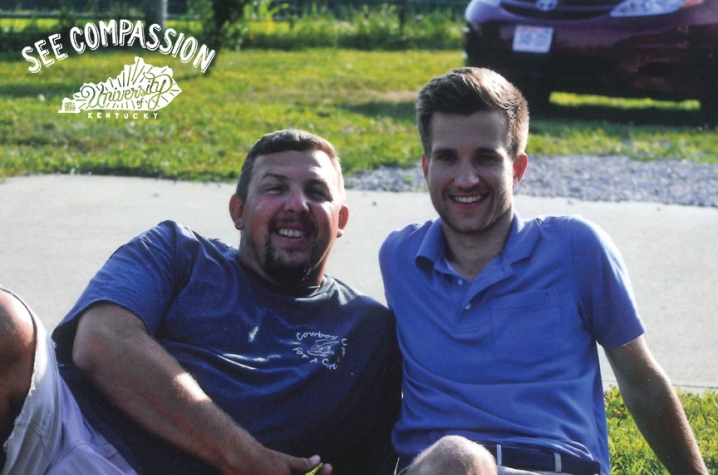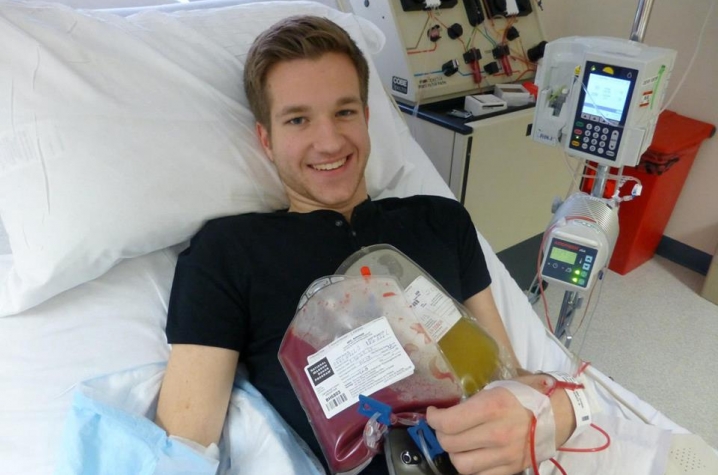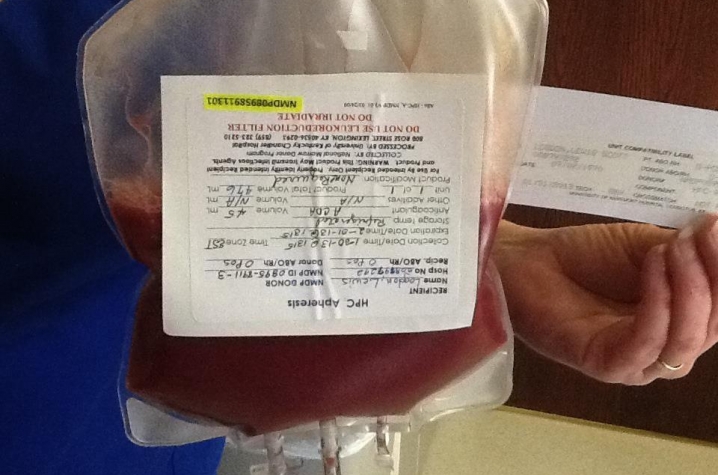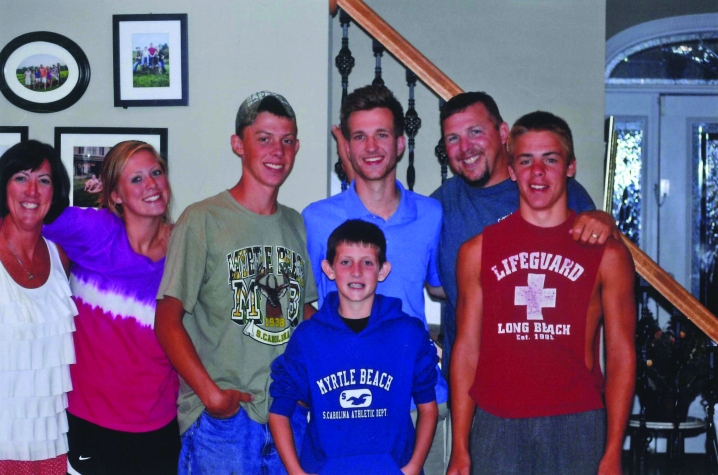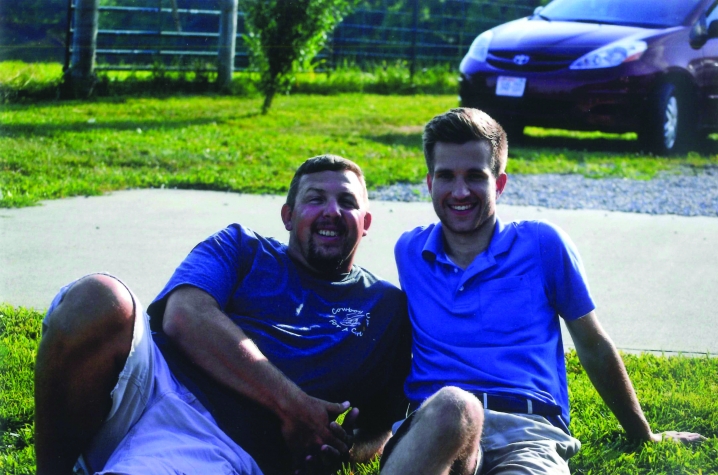A Little "Badger Blood" Helps UK Patient Fight Cancer
LEXINGTON, Ky. (April 3, 2015) – Scott Logdon of Salvisa, Ky., seldom needed to visit the doctor. But in September 2012, a troublesome sore throat prompted him to make a rare visit to his primary care physician. Expecting a diagnosis of strep, he got some far worse news.
"I just thought it was strep throat," Logdon said. "It turned out to be leukemia."
Logdon was immediately referred to the University of Kentucky Markey Cancer Center, where he was officially diagnosed with acute myeloid leukemia (AML), a type of cancer that affects the blood and bone marrow.
Because this type of cancer can worsen quickly, treatment began right away. Logdon underwent a rigorous round of chemotherapy at Markey, getting his infusion nonstop 24 hours a day for seven straight days.
The chemo put him into temporary remission. But further testing suggested that Logdon's cancer was likely to return at some point. While taking the “wait and see” approach was an option, it was risky.
“Statistically speaking, in high-risk patients like Scott, the cancer is probably going to come back,” said Dr. Greg Monohan, the Markey hematologist/oncologist who treated Logdon. “And if you wait and see if the cancer returns, the chemo may not take as well the second time around.”
Monohan’s team began discussing the option of a bone marrow transplant, a procedure that replaces damaged bone marrow with healthy bone marrow stem cells. Markey performs more than 80 bone marrow transplants each year.
Logdon agreed to try the transplant in October 2012, and the search for a viable donor began. The likelihood of transplant success is highly dependent on how closely the donor’s stem cells matches the recipient’s, and usually the best donors are siblings.
However, Logdon's brother and sister were tested, and neither were a match. His medical team then contacted the National Marrow Donor Program where he could potentially be matched with an anonymous donor from one of the international bone marrow registries.
In the meantime, Logdon underwent several rounds of ‘maintenance’ chemotherapy, aimed at keeping the cancer at bay until a match was found. Every 30 days, he endured five straight days of treatment, followed by a 10-day inpatient stay at Markey where he was monitored closely by Monohan’s team. Waiting took its toll on Logdon and his family, but an unexpected phone call of encouragement from UK Men's Basketball Coach John Calipari brightened the UK fan's spirits.
"Scott has had some dark days," said Angela Logdon, Scott's wife. "But he really appreciated Coach Cal taking the time to do that."
In January 2013, Logdon and his family got the call they’d been waiting for. An ideal donor had been found: a 20-year-old male who matched 10 out of the 10 major categories of proteins that determine the likelihood of the immune system accepting the transplantation.
*****
While walking toward the campus library one afternoon three years ago, University of Wisconsin freshman Christopher Wirz passed by tables for a national bone marrow registry donor drive. Wirz’s cousin was one of the UW students working the drive, and when he stopped to chat, she convinced him to register.
“I signed up on a whim,” Wirz said. “I just happened to be walking that way that day.”
Wirz was told that his chances of actually getting matched were slim – only about one in 100,000. But in just over a year, Wirz got the call to be a potential donor twice – the first time, he wasn’t a close enough match. But the second time, he was a perfect candidate. He agreed to do the procedure.
Wirz was flown to Washington D.C. on two separate occasions, once for major testing and evaluation, and once for the stem cell harvesting. Prior to extraction of his cells, he received a series of injections to help his stem cells move from the bone marrow to the blood. He was tested again before the extraction began to ensure his blood counts were optimal.
“You’re kind of rooting for it, even though you don’t know the person,” Wirz said. “I was really cheering for good numbers.”
His stem cells were collected using a process called leukapheresis, which is similar to giving plasma. Wirz was hooked up to an IV for several hours to extract the stem cells from his blood, filling a large IV bag with the life-saving fluid, while another IV returned the blood to his body. After his donation was complete, Wirz felt a little tired, but spent the rest of his day touring DC before heading home. He thought about where that little piece of him could be going.
“I was wondering, ‘What happens to it now?’” Wirz said. “Where is it being delivered?”
*****
Logdon received his bone marrow transplant on Jan. 31, 2013, following one last round of chemo. After nearly four weeks in the hospital, he was allowed to go home, though he continued to have weekly checkups for many months. Logdon's strength gradually returned, and he was able to return to his job at the Woodford County Detention Center, initially working part-time, in October.
“It took about a year to feel ‘normal’ again,” Logdon said.
Unrelated hematopoietic cell donations are anonymous – and any contact between the donor/recipient remains anonymous during the first year. After that mark, direct contact is allowed if both parties consent to release their personal information. Wirz received a handful of letters thanking him for his donation – from Scott, Angela, and their four children, including one carefully scrawled by their eight-year-old son.
Curious about the family, Wirz found them on Facebook, where Angela and Scott had documented every step of his illness.
“I saw his entire journey, from diagnosis and after,” Wirz said. “He was going through this life-threatening disease, but stayed so positive throughout it.”
That included some big moments: statuses about their joy at finding a match, and the happy outcome of the procedure, where Logdon was deemed cancer-free.
“I thought, ‘That’s me!’” Wirz said. “He has a part of me growing in him, and that’s what’s helping him.”
The two communicated via Facebook for several weeks, but their first phone call came early in April 2014 -- just a few days, in fact, after the University of Kentucky Men’s Basketball Team knocked off the University of Wisconsin in the semifinal game of the NCAA tournament.
Logdon, who describes his whole family as “die-hard UK fans,” couldn’t resist making a joke to the young Wisconsin student.
“I told him, ‘You know, I knew I felt kind of bad about beating Wisconsin in the tournament,’” Scott said. “’I guess it’s because I’ve got a little Badger blood in me now!’”
*****
Later that summer, the Logdons invited Wirz and his family to come to Kentucky for the opportunity to celebrate and thank them in person. The first meeting between donor and recipient was emotionally overwhelming.
"There were a lot of tears," Logdon said. "I didn't want to let go of him when I hugged him."
Wirz, his sister, and his mother stayed for three days, touring the area and meeting dozens of thankful friends and family. One of the tour stops included Rupp Arena, where they convinced Wirz to try an Ale8 -- and, Logdon jokes, to show off UK's basketball tradition.
"We took him to Rupp Arena to show him where championships happen," Logdon said with a laugh.
Wirz, who described the whole experience as "amazing," said seeing how beloved Logdon was in his community made the whole experience finally seem real.
"Getting to see his community, and seeing how everything would be different without him," Wirz said. "That was really overwhelming."
"He's a very giving guy," Logdon said. "You don't see many 20-year-olds like him."
Wirz, now a senior and a triple-major at UW, said he wouldn't hesitate to help out another anonymous patient in need again.
"I would do it again in a heartbeat," Wirz said.
*****
Signing up to become a donor in the marrow registry is easy – participants only need to fill out about five minutes of paperwork and complete a set of cheek swabs.
On Monday, April 13, the UK College of Pharmacy is hosting a Be the Match registry drive at the UK Markey Cancer Center. The drive will be set up at the Combs Research Building atrium at Markey from 11 a.m. to 2 p.m. that day. If you can't make it to a local drive but would like to join the registry from home, visit Be the Match for more information.
MEDIA CONTACT: Allison Perry, 606-782-7735, allison.perry@uky.edu or Kristi Lopez, 859-323-6363 or kristi.lopez@uky.edu





